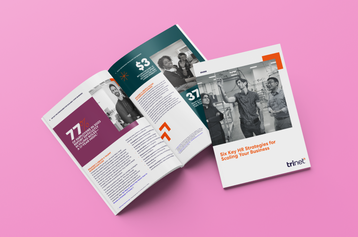Challenges of Human Capital Management: 16 Ways to Get the Most out of HCM

Table of contents
- 1.Top Challenges of Human Capital Management
- 2.Attracting top talent
- 3.Onboarding
- 4.Retaining talent
- 5.Catering to a multi-generational workforce
- 6.Remote work and its implications
- 7.Addressing skills gaps
- 8.Training and development
- 9.Instilling or improving work culture (high-performance culture)
- 10.Employee engagement
- 11.Addressing employee health and mental well-being
- 12.Leadership development
- 13.Strategic workforce planning
- 14.Leveraging workforce analytics
- 15.Change management
- 16.Balancing employee expectations and business objectives
- 17.Measuring HR effectiveness
- 18.Making the Most of Your Capital
Human capital management (HCM) is an approach for managing an organization's most valuable asset — its employees. It goes beyond traditional human resources functions to treat employees as assets to be invested in rather than a cost of doing business. It involves aligning human capital strategies with overall business objectives.
A useful HCM program recognizes that human capital (which includes employees' knowledge, skills, and abilities) is a critical driver of organizational success. Through investing in this capital and managing it effectively, organizations can enhance productivity, increase employee satisfaction, and drive business performance. HCM takes a holistic view of the employee lifecycle. Every stage — from recruitment to retirement — receives careful planning, execution, and evaluation.
A strong human capital management program can help a business thrive because of the positive effects of developing employees. In this article, we'll explore some important challenges of human capital management and how it can help your business succeed.
Top Challenges of Human Capital Management
Businesses and their HR professionals face many challenges, especially in the global workspace — from cultural problems to training issues. But there's good news — many HR challenges can be solved through an effective and focused human capital management program. Let's look at some of the ways that HR teams can use HCM to get the most from a modern workforce.
1. Attracting top talent
HCM recruitment strategies include developing an employer brand to showcase the business as an attractive workplace. Leveraging social media and other digital resources as recruitment channels reaches a wider candidate pool for talent acquisition. To attract top talent, HCM emphasizes competitive compensation and benefits while offering opportunities for career growth and development.
2. Onboarding
A comprehensive onboarding process helps new employees feel welcomed, supported, and equipped to effectively perform their new roles. HCM focuses on clearly defining job expectations, providing necessary training programs, and assigning mentors to help new employees thrive. By investing in strong onboarding practices, new employee engagement and integration can be accelerated, setting the stage for high productivity from the start.
3. Retaining talent
One of the major HR challenges is retaining a company's most valuable assets: top talent. Proactive strategies involve understanding employee motivations and creating positive work environments to show employees how they are valued. HCM programs promote work-life balance initiatives and provide constructive feedback and recognition. With a fully supported and engaged workforce, employee experience is improved while employee turnover is reduced. It's a win-win situation for any business.
4. Catering to a multi-generational workforce
HCM understands that today's workforce combines several generations. Each has unique work preferences, workstyles, expectations, and motivations. Flexible work arrangements, diverse training and development programs, and variable recognition/rewards cater to different age groups. HCM also emphasizes a culture of inclusion and respect, so all generations can effectively collaborate and contribute. HCM strives to create harmonious and productive multi-generational workforces, boosting employee morale and mental health.
5. Remote work and its implications
The last few years have seen a large increase in remote work—embraced like never before in the workplace. But there can be downsides, such as getting remote workers the tools and training they need and helping them feel connected. HCM focuses on effective communication and collaboration practices for remote teamwork, while also ensuring that proper technologies and infrastructures are in place. By considering every employee as an asset, HCM offers the tools and techniques for properly evaluating remote performance and providing proper feedback. This promotes increased employee satisfaction and helps with talent retention.
6. Addressing skills gaps
Any HR department knows that skill gaps hinder performance and long-term business success. And this is exacerbated by technology's constantly changing nature. HCM identifies current and future skill needs, conducts regular skill assessments, and develops strategies to fill those gaps. Performance management is improved through training programs and partnering with educational providers to target skill building. HCM also develops succession planning and talent pipelines to ensure a continuous source of skilled workers.
7. Training and development
It's important to invest in training and development to expand employee knowledge and skills for current and future requirements. HCM identifies individual development needs, provides relevant training, offers mentor and coaching programs, and creates a continuous learning culture. Through training and development prioritization, HCM enhances employee capabilities, performance, and overall effectiveness.
8. Instilling or improving work culture (high-performance culture)
A positive work culture drives operational success. It requires a clear vision, value set, and expectations aligning with company goals. HCM emphasizes effective leadership, transparent communication, and regular feedback to encourage continuous improvement. HCM promotes collaboration, rewards achievements, and promotes inclusive work environments to generate a high-performance workplace culture.
9. Employee engagement
Engaged employees are more committed, productive, and satisfied. HCM implements strategies to enhance engagement through meaningful work assignments, growth and advancement opportunities, decision making participation, and regular feedback/recognition. In concert with other methods mentioned in this article, HCM helps organizations create a motivated and committed workforce.
10. Addressing employee health and mental well-being
HCM acknowledges that employee health, wellness and mental well-being are central to overall organizational performance. HCM builds supportive policies, programs, and resources to promote employee well-being. Access to health benefits, wellness programs, and flex work arrangements across all job roles can help increase productivity and build a resilient workforce.
11. Leadership development
Effective leadership is critical to success. HCM works to identify and develop high-potential employees with targeted leadership development programs. Through mentoring and coaching programs, and encouraging continuous learning and growth, HCM enhances leadership skills and ensures leadership continuity.
12. Strategic workforce planning
Aligning workforce strategies and organizational goals is vital to business success. Through analysis of business needs, combined with demographics, tech advancements, and market trends, HCM proactively plans future talent requirements. This reduces skills gap and optimizes staffing levels to meet strategic objectives.
13. Leveraging workforce analytics
Well-informed decisions are central to workforce development. HCM programs analyze data factors such as performance, retention, engagement, and skills gaps. Using this data, HCM identifies trends and patterns to make data-driven choices related to talent acquisition, development, and management. These approaches optimize resource allocation, enhance productivity, and improve human capital decision making.
14. Change management
Creating change management strategies to guide employees through times of change minimizes resistance and boosts readiness. HCM focuses on involving employees in the change process, ensuring effective communication and recognizing the emotional impact of change. This helps businesses navigate transitions, maintains employee engagement, and minimizes productivity disruptions.
15. Balancing employee expectations and business objectives
HCM seeks to align employee expectations with business objectives through effective communication and transparency. This allows employees to understand organizational goals and why their day-to-day work is important to business success. By prioritizing employee engagement, HCM builds a culture of mutual trust and respect. Employees are reassured that their voices are heard and their needs are considered by business leaders.
16. Measuring HR effectiveness
Measuring HR effectiveness involves establishing key performance indicators (KPIs) and metrics to evaluate HR's overall impact. HCM analyzes employee satisfaction, talent acquisition, performance management, and employee retention and development. Using data from surveys and other mechanisms, HCM identifies improvement areas, makes data-backed decisions, and continuously enhances HR practices to support business goals.
Making the Most of Your Capital
TriNet is a leading provider of comprehensive HR solutions including human capital consulting solutions for small and medium-sized businesses. With a deep understanding of the unique HR challenges faced by businesses, TriNet offers a range of capabilities and 24/7 support.
TriNet services help empower businesses to make better people decisions about their workforces, streamline HR processes, and stay on top of compliance. With TriNet as a provider, businesses can focus on growth and success — while TriNet’s experts help you handle your toughest HR needs.
This communication is for informational purposes only, is not legal, tax or accounting advice, and is not an offer to sell, buy or procure insurance.

TriNet Team
Table of contents
- 1.Top Challenges of Human Capital Management
- 2.Attracting top talent
- 3.Onboarding
- 4.Retaining talent
- 5.Catering to a multi-generational workforce
- 6.Remote work and its implications
- 7.Addressing skills gaps
- 8.Training and development
- 9.Instilling or improving work culture (high-performance culture)
- 10.Employee engagement
- 11.Addressing employee health and mental well-being
- 12.Leadership development
- 13.Strategic workforce planning
- 14.Leveraging workforce analytics
- 15.Change management
- 16.Balancing employee expectations and business objectives
- 17.Measuring HR effectiveness
- 18.Making the Most of Your Capital






